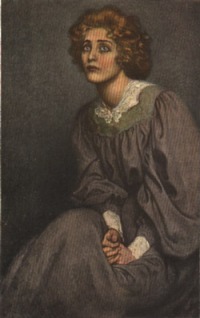
‘Jim, there is no disguising the fact that the American people are as helpless in the hands of these thugs of the ‘System’ as though they lived in the realm of the Sultan, where a few cutthroat brigands are licensed to rob and oppress to their heart’s content. Jim Randolph, you know this game of finance. You know how it is worked and the men who work it. Tell me if there is any consideration due Wall Street and its heart-and-soul butchers at the hands of honest men.’
I scooped this title up in my search for 1907 titles for Crimes of the Century. It isn’t strictly speaking a crime novel (although I think the author wouldn’t have agreed with me) – but you could call it a financial thriller.

Gillian Anderson in the role of Beulah Sands – Frontispiece by Sigismond de Ivanowski
Bob Brownley is a successful young trader on Wall Street who falls in love with Southern belle Beulah Sands. Beulah has come to New York with her life savings in order to protect the good name of her family back in Virginia. Her father Judge Sands has been bilked by city traders and wants to pay back his creditors, but insists that the money has to be made through honest trading and not through Wall Street trickery.
‘I have decided, because of my duty to my father, to put away my prejudice against gambling, but no duty to him or to any one can justify me in playing with marked cards.’
Beulah’s honesty and beauty bewitch Bob, and he resolves to help her in any way possible. They have good fortune and seem on their way to repaying the Judge’s creditors and making a tidy profit to boot. But then they lose the lot in a few hours thanks to a fall in the price of sugar, a fall engineered by the powers-that-be (the ‘System’) to line their own pockets.
‘Poor fool that I was, I did not take into consideration the loaded dice of the master thieves.’
Bob swears to take his revenge and cooks up a cunning scheme which almost wrecks Wall Street but makes back all of the money and a tidy profit to boot – but not without massive human cost. This is the first step on a journey which leads him to fanaticism and a secret campaign to bring down the System.
The author, Thomas W. Lawson was an interesting character. A (possibly) crooked financier turned whistle-blower who became something of a folk hero. His expertise comes through in the book. I can never follow the jargon of stocks and shares, but there are some passionately described scenes of trading.
His voice was still clear and unimpaired by the terrible strain of the past two hours. To that mob it must have sounded like the trumpet of the delivering angel. “80 for any part of 25,000 Sugar.” Instantly Sugar was hurled at him from all sides of the crowd. He was the only buyer of moment who had appeared since Sugar broke 125. Barry Conant and his lieutenants had disappeared like snowflakes at the opening of the door of
the firebox of a locomotive speeding through the storm. In a few seconds Bob had been sold all the 25,000 he had bid for. Again his voice rang out: “80 for 25,000.” The sellers momentarily halted. He got only a few thousands of his twenty-five. “85 for 25,000.” A few thousands more. “90 for 25,000.” Still fewer thousands. His bidding was beginning to tell on the mob. A cry ran through the room into the crowds around the other poles–“Brownley has turned!”–and taking renewed courage at the report, the bulls rallied their forces and began to bid for the different stocks, which a moment before it had seemed that no one wanted at any price.
He is certainly better at describing Wall Street than he is at the lovey-dovey stuff, which is pretty embarrassing.
But again I saw a picture that transfixed me. Bob had taken Beulah by both shoulders and he held her off and looked into her eyes long and beseechingly. Never before nor since have I seen upon human face that glorious joy which the old masters sought to get into the faces of their worshippers who, kneeling before Christ, tried to send to Him, through their eyes, their soul’s gratitude and love. I stood as one enthralled. Slowly and as reverently as the living lover touches the brow of his dead wife, Bob bent his head and kissed her forehead.
Yuk.
Forgetting about that stuff, I think this book taps into some significant undercurrents in American social history and is therefore an important window onto 1907. It would of course be lovely to say that Friday, the Thirteenth is an interesting period piece. However, as far as I can see we’re still pretty much at the mercy of ‘Frenzied Finance’ – probably more so than ever.




Hmmm.. It may not qualify as a crime novel, strictly speaking. But it certainly doesn’t qualify as a good romance novel, either, Rich! 😉 – In all seriousness, it does sound an interesting look at the times.
LikeLike
Thanks Margot 🙂
LikeLike
Took me about a minute to realize that’s a joke about Gillian Anderson. It really does look like her.
There was an entire subgenre of “financial melodramas” and con artist novels in early 20th century American popular fiction. The best known writer of this kind of fiction was George Randolph Chester. He created the character “Get Rich Quick” Wallingford who appeared in a series of books and stories.
LikeLike
I think it’s an incredible resemblance. Is there an X Files where she goes back in time?
Irresponsible high finance theme that comes out in The Red Thumb Mark too.
LikeLike
Not yet there isn’t.
LikeLike